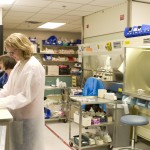 The Joseph B. Whitehead Foundation has given $30 million to Children’s Healthcare of Atlanta to support pediatric research. The grant includes $25 million to help fund a new research building located on the Emory campus, and $5 million to support the Marcus Autism Center.
The Joseph B. Whitehead Foundation has given $30 million to Children’s Healthcare of Atlanta to support pediatric research. The grant includes $25 million to help fund a new research building located on the Emory campus, and $5 million to support the Marcus Autism Center.
The grant will allow Children’s and Emory to expand their research partnership, attract top scientists, and advance research discoveries that will improve the health of children.
Some of the pediatric research conducted in a new building to be built on the Emory campus will focus on cardiology, cancer, vaccines, and new drug discovery. The grant has implications for the city of Atlanta as a growing research community, building on collaborations among Children’s Healthcare, Emory, Georgia Institute of Technology, Morehouse School of Medicine, and others.
Fred Sanfilippo, MD, PhD, executive vice president for health affairs at Emory, and Donna W. Hyland, president and CEO of Children’s Healthcare of Atlanta, explained that the new grant, which is the largest single gift ever to Children’s, will have an enormous impact on the two institutions, building on the strong partnership between Emory and Children’s and leading them to become a major pediatric research hub in the Southeast and the nation. Most importantly, it will help in finding cures for some of the most common and devastating childhood diseases.





 There’s a place in Midtown Atlanta called the
There’s a place in Midtown Atlanta called the ![Rongfinalv3[2] 47 Red and green depict the parts of the HIV envelope protein that mutated in two patients (185F and 205F) in response to pressure from their immune systems. The rest of the envelope protein is blue.](http://www.emoryhealthsciblog.com/wp-content/uploads/2009/09/Rongfinalv32-47-300x153.jpg)